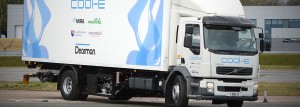 Anyone out on the roads of the UK, or the rest of Europe or North America today, will see enormously polluting vehicles. I don’t mean the common petrol or diesel-powered car. I’m referring to those many, often anonymous looking, vans carrying perishable goods.
Anyone out on the roads of the UK, or the rest of Europe or North America today, will see enormously polluting vehicles. I don’t mean the common petrol or diesel-powered car. I’m referring to those many, often anonymous looking, vans carrying perishable goods.
Until I received a press release about a British company with what could be a breakthrough solution, I didn’t even know there was a problem.
It is this, in essence. Those vans are carrying perishable goods, destined for shops, supermarkets and homes. They keep their cargo cool on the road through a conventional diesel powered engine. This system produces a lot of Co2: the 1m transport refrigeration units on European roads are said to give off as much pollution as 55m diesel cars.
Enter the UK company Dearman. It has developed what is claimed to be the first zero-emission engine to power the cooling system in refrigerated vehicles. Dearman says this technology, neatly described as “clean cold”, is cheaper to run than the conventional engine and will not only drastically reduce pollution, but also save companies money.
The company, based in Croydon in South London, has recently received £16m of funding from Park Vale Capital. This represents the UK’s biggest clean tech investment of the last 12 months. Trials of Dearman’s refrigeration system, based on a unique process that uses liquid nitrogen to deliver zero-emission power and cooling, are due to to begin in the UK in early 2016, with international trials following later in the year.
Dearman, which describes itself as a “clean cold and power technology company”, outlined the potential scale of the challenge to keep goods cool in transit, and the possible commercial rewards in addressing it, in a report Liquid Air on the Highway (2015). Overall demand for cooling in all its forms – air conditioning, data, industry, food and medicine – is soaring worldwide. The challenge is particularly acute in transport.
The worldwide demand for “cold” transportation, to service the lifestyles of the fast growing urban middle classes and their demand for perishable goods, as well as to reduce high levels of food loss, is expected to grow 13% per year. As developing countries grow richer, particularly in Asia and South America, the number of refrigerated vehicles on the road is expected to increase considerably.
Some emerging markets are already seeing 25%+ year-on-year growth. Dearman’s report suggests that there could be 15.5 million refrigerated vehicles worlwide by 2025, up from fewer than 3 million in 2013. There could be an enormous adverse environmental effect if hauliers persist with existing technology.
There has not been much media interest in the pollution from conventional cooling. A refrigeration unit can consume up to 20% of the diesel of the vehicle it is on, while emitting up to six times as much NOx (nitrogen oxides) and 29 times as much of the PM (particulate matter) of the truck’s modern engine.
So, could 2016 be the breakthrough year for Dearman, one of the leading companies proposing a technological fix? The £16 million backing pledged by Park Vale Capital to support its development brings the total funds raised by Dearman during 2015 to £19.5 million, enabling the company to bring the first application of its radical new process to market. It is planning to sell its potential solution widely abroad as well as in the UK.
The company now employs over 60 people at two sites. One of them, the Dearman Clean Cold and Power Technology Centre, houses the company’s R&D and engineering activities. It was opened in 2015 by UK Universities and Science Minister Jo Johnson MP.
